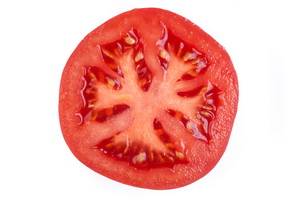
CRISPR Scissors Utilized to Break Yield Barrier in Crops
September 20, 2017| |
 Scientists at Cold Spring Harbor Laboratory (CSHL) have tapped genome editing to improve agricultural crops. Using tomato as an example, they used CRISPR-Cas9 technology to rapidly generate variants of the plant that display a broad continuum of three separate, agriculturally important traits: fruit size, branching architecture, and overall plant shape -- components that determine plant yield. The method is designed to work in all food, feed, and fuel crops, including the staples rice, maize, sorghum, and wheat.
Scientists at Cold Spring Harbor Laboratory (CSHL) have tapped genome editing to improve agricultural crops. Using tomato as an example, they used CRISPR-Cas9 technology to rapidly generate variants of the plant that display a broad continuum of three separate, agriculturally important traits: fruit size, branching architecture, and overall plant shape -- components that determine plant yield. The method is designed to work in all food, feed, and fuel crops, including the staples rice, maize, sorghum, and wheat.
The team used CRISPR "scissors" to make multiple cuts within three tomato genome sequences known as promoters — areas of DNA near associated genes which help regulate when, where, and at what level these "yield" genes are active during growth. The scientists were able to induce a wide range of changes in each of the three targeted traits.
By using CRISPR to mutate regulatory sequences, the CSHL team found that a much subtler impact on quantitative traits is possible. Fine-tuning gene expression rather than deleting or inactivating the proteins they encode is most likely to benefit commercial agriculture because of the flexibility such genetic variation provides for improving yield traits.
CSHL Professor Zachary Lippman, who led the research says, "Traditional breeding involves great time and effort to adapt beneficial variants of relevant genes to the best varieties, which must continuously be improved every year. Our approach can help bypass this constraint by directly generating and selecting for the most desirable variants controlling gene activity in the context of other natural mutations that benefit breeding. We can now work with the native DNA and enhance what nature has provided, which we believe can help break yield barriers."
For more details, read the CSHL News and Features.
| |
Biotech Updates is a weekly newsletter of ISAAA, a not-for-profit organization. It is distributed for free to over 22,000 subscribers worldwide to inform them about the key developments in biosciences, especially in biotechnology. Your support will help us in our mission to feed the world with knowledge. You can help by donating as little as $10.
-
See more articles:
-
News from Around the World
- OFAB Nigeria Recognizes Media for Effective Biotech Reporting
- Uganda Harvests Another Successful GM Cassava Trial
- Purdue Researchers Identify New Soybean Gene to Fight Phytophthora
- Vietnam Encourages Use of GM Corn to Increase Productivity
- FSANZ Calls for Submission on GM Canola Application
- Brookes Presents Global Impact of Biotech Crops (1996-2015) to Indonesian Stakeholders
- Filipino Farmers Await Bt Eggplant Commercialization
-
Research Highlights
- Gene from Wild Grapevine Involved in Powdery Mildew Response in Transgenic Grapevine
- MsmiR156 Promotes Root Development and Nitrogen Fixation Activity in Alfalfa
- Cry1Ac in Tomato Confers Resistance to Tomato Leaf Miner
-
Beyond Crop Biotech
- Scientists Sequence Apostasia Orchid Genome
- Increased Expression of FSH Decreases Fecundity in Transgenic Female Pigs
-
From the BICs
- Integrating Biotech Training in Uganda's Education System
-
Plant
- CRISPR-Cas9 Used to Analyze Cold Tolerance Related Transcription Factors in Rice
- CRISPR Scissors Utilized to Break Yield Barrier in Crops
-
Read the latest: - Biotech Updates (January 21, 2026)
- Gene Editing Supplement (January 28, 2026)
- Gene Drive Supplement (February 22, 2023)
-
Subscribe to BU: - Share
- Tweet
